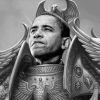- 19 May 2013 03:10
#14238364
I just watched it today. I've been a Star Trek fan for about 30 years. With respect to Libertarianism, there is certainly a lot about Star Trek to criticize, including even in the current movie. As a Star Trek fan the movie was great, exceeding my expectations.
But one of the central plots of Star Trek Into Darkness is unquestionably a critique of American foreign policy with respect to drone strikes against American citizens and/or against people who have had no opportunity to defend themselves in a court of law. I thought it was pretty interesting. I believe the movie should prove useful to engage interventionists, neo-cons and warmongers in a discussion of the reasons for and responses to terrorism, collateral damage and the immorality of drone strikes etc. In fact I did just that with a friend I took to see the movie (not knowing about this plot point) and pointed out the connection and the truth to him afterwards. Thankfully, the movie, in the context of the Star Trek universe, takes the high road in solving the problem. I also applaud JJ Abrams for having the courage to make such a contentious issue a central theme of a Summer blockbuster movie.
But one of the central plots of Star Trek Into Darkness is unquestionably a critique of American foreign policy with respect to drone strikes against American citizens and/or against people who have had no opportunity to defend themselves in a court of law. I thought it was pretty interesting. I believe the movie should prove useful to engage interventionists, neo-cons and warmongers in a discussion of the reasons for and responses to terrorism, collateral damage and the immorality of drone strikes etc. In fact I did just that with a friend I took to see the movie (not knowing about this plot point) and pointed out the connection and the truth to him afterwards. Thankfully, the movie, in the context of the Star Trek universe, takes the high road in solving the problem. I also applaud JJ Abrams for having the courage to make such a contentious issue a central theme of a Summer blockbuster movie.


















 - By skinster
- By skinster